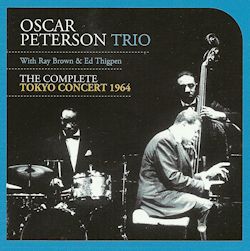CD 1
1. Reunion Blues
2. At Long Last Love
3. I Remember Clifford
4. Bags' Groove
5. Maidens Of Cadiz
6. Tangerine
7. Like Someone In Love
8. Satin Doll
9. Tricotism
10. It Ain't Necessarily So
11. I Loves You Porgy
CD 2
1. Tonight
2. Fly Me To The Moon
3. Somewhere
4. Yours Is My Heart Alone
5. Hymn To Freedom
6. Younger Than Spring Time
7. Misty
8. Django
9. The Smudge
10. Autumn Leaves
11. Moanin'
12. Lovers' Promenade
13. Children's Tune
Oscar Peterson Ė Piano
Ray Brown Ė Bass
Ed Thigpen Ė Drums
Of all the groups led by Oscar Peterson, I think the best was his trio with Ray Brown and Ed Thigpen. Petersonís trios with such guitarists as Barney
Kessell and Herb Ellis were excellent in their way, but the replacement of a guitarist with a drummer gave the trio much more punch and vigour. Ed Thigpen
could provide accents which drove the music forward and added to the groupís enviable swing.
After this appearance in June 1964, Ed Thigpen would only be with the trio for another year: his last concert with them was in Copenhagen in May 1965. The
whole of that concert is added to the second of these CDs as tracks 6 to 13, although I doubt if this is that complete concert, as the tracks only amount
to less than 42 minutes, which is rather measly for a whole eveningís entertainment.
Thigpen had been with the trio since 1959, and Ray Brown first played with Oscar Peterson in 1949, so they knew one another well and played with a seamless
togetherness. This is illustrated by a track like Yours Is My Heart Alone (better known as You Are My Heartís Delight), where the trio
stays together despite the frantic tempo. Each member of the group had a technique which could cope with such extreme tempos. In addition, Peterson liked
to break up tunes into unexpected segments and he could excite an audience with his melodramatic endings. Ray Brown meanwhile was generally regarded as the
finest bassist ever, with a deep tone and impeccable technique which added to swing and propulsion. Ed Thigpen also had a wonderful technique. He knew how
to use it tastefully and without going to excess.
The opening Reunion Blues (a Milt Jackson composition which was one of Oscarís favourites) begins with an almost free-improv drum sequence by
Thigpen, with Ray Brown coming in to set the beat. One very impressive thing in this track is Oscarís delicate touch, which can be gentle as well as
forceful. Both this and At Long Last Love have an easy swinging tempo which was one of Oscarís finest achievements. The latter track displays
another Peterson characteristic: his delight at quoting other songs in the midst of his solos, which here include Jerome Kernís Bill.
Other highlights of the Tokyo concert comprise a tender reading of I Remember Clifford; an intriguing stop/start interpretation of Tangerine; and a dignified version of Oscarís own Hymn To Freedom.
The audience is rather too eager to applaud at very opportunity but this is a classic Peterson Trio recording supplying both softness and swing. The
Amsterdam concert has a rather more enclosed acoustic but this brings the group closer to the listener. There is a hustling Younger Than Springtime, an imposing Django, and an understated Loversí Promenade Ė an original by Peterson.
Tony Augarde
www.augardebooks.co.uk
